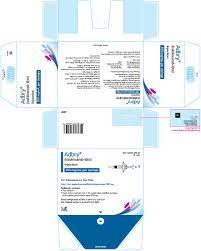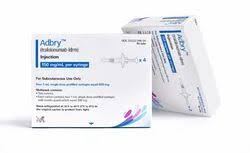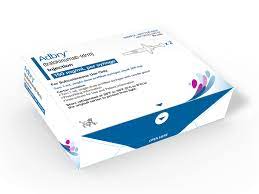
What is Adbry?
Adbry is a prescribed medicine that is used to treat adults suffering from moderate to severe atopic dermatitis (eczema) that is not easily controlled by prescription treatments that are applied to the surface (topical) or who are unable to use topical treatments. Adbry can be administered alongside or without corticosteroids applied to the skin.
It isn't known whether Adbry is effective and safe for children.
Not for:
Don't use Adbry if you are allergic to tralokinumab or any of the other ingredients. Look at the bottom of the page for a full description of all the components.
Prior to Using this Drug
Before you begin treatment, inform your doctor about any medical issues or conditions you have, such as:
-
Have eye problems.
-
Have an infection that is a parasitic (helminthic) illness.
-
Are set to get any vaccines. It is not recommended to receive a "live vaccine" if you have been treated with Adbry.
-
Are pregnant, planning to be pregnant, or plan to be pregnant. It isn't known if Adbry could harm the baby you are expecting.
-
If you are nursing or planning to breastfeed, It's unclear if Adbry can be found in breast milk and whether it is harmful to your baby.
Interaction with Other Drugs
Discuss with your healthcare provider the medications you are taking, such as prescription and over-the-counter supplements, as well as vitamins and herbal supplements.
How to Take Adbry?
-
Read the complete Instructions for Use included with your prescription for details about how to make and administer Adbry and the best way to keep and dispose of old Adbry prefilled syringes.
-
Follow the exact dosage as recommended by your physician.
-
Your doctor will inform you of the amount of Adbry you can inject and the best time to inject it.
-
Adbry is a single-dose (150 mg) filled syringe that comes with a needle guard.
-
Adbry is administered by injection into the skin (subcutaneous injection).
-
If your healthcare provider determines that you or your caregiver is able to administer the injections, then you or your caregiver should be given instructions on how to prepare and inject Adbry. Do not attempt to inject Adbry unless you've been instructed on the correct way to inject it by your healthcare provider.
-
If you do not take your dose, administer the dose you missed as quickly as you can, and then take your next dose at the regular scheduled time.
-
In the event that you take more Adbry than you are prescribed, contact Poison Control at 1-800-222-1222.
-
Your doctor may prescribe other medications to be used alongside Adbry. Make sure to take the prescribed medications precisely as your doctor directs you to.
Detail on Dosage
Usual Adult Dosage for Atopic Dermatitis
Initial dose of 600 mg (four 150 mg injections), followed by 300 mg (two 150 mg injections) given every two weeks. A dose of 300 mg every four weeks could be suggested for patients who weigh less than 100 kilograms and attain a clear or clean complexion after 16 weeks.
Treatment of moderate-to-severe atopic dermatitis in adults whose condition is not effectively controlled by prescribed topical therapies or when these therapies aren't advised
Side Effects of Adbry
Adbry can have serious side effects, which include:
-
Reactions to allergens (hypersensitivity) This includes an extreme reaction known as anaphylaxis. Take a break from Adbry and speak to your doctor or seek immediate help if you experience any of the symptoms listed below
-
Breathing issues
-
Swelling of the mouth, face, and tongue
-
Hives
-
Itching
-
Fainting, fainting, dizziness fainting, dizziness, being lightheaded (low blood pressure)
-
Skin the rash
- Eye issues
The most frequent side effects are:
-
Eyelid and eyelid inflammation such as swelling, redness, and itching
-
Injection site reactions
-
The high number of specific white blood cells (eosinophilia)
They aren't all the possible adverse effects. Consult your physician for advice from a medical professional regarding adverse effects. You can report symptoms to the FDA at 1-800-FDA-1088.
What Should be Avoided?
Some medicines are used for reasons other than those stated in the patient information leaflet. Don't use this medication for any health condition for which it is not recommended. Don't offer it to anyone else, even if they suffer from similar symptoms to yours. They could be harmed by it. Ask your doctor or pharmacist for any information specifically written for health professionals.





